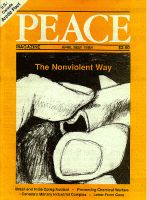Speechless For Once?
By Barry Stevens | 1988-04-01 12:00:00
After the INF treaty was signed, a friend reported that his parish priest, long critical of the peace movement, said that it proved that the movement was wrong -- that by being tough and "negotiating from strength" the U.S. and NATO had "won" this significant achievement. This belief, for which my friend had no reply, is the official line taken by public officials in the U.S. and Canada. We need a reply. So:
- It is unlikely that any arms control or disarmament agreement would have been concluded without continuous pressure from the peace movement. The pressures to continue the arms race are huge, and only an unusual configuration of political forces led to this treaty's being signed. These included a U.S. presidency weakened by scandal and anxious to curry favor. Had there been no articulated world opinion in favor of ridding ourselves of nuclear weapons, there would have been no political motivation to conclude the deal.
- The Soviets were so eager to strike a deal that they accepted an offer requiring them to give up far more than the other side. Was this a result of Reagan's being "tough"? Maybe, but in the past when the U.S. has got tough, it has often had the opposite effect. For instance, a Congressional bill a decade ago made U.S./Soviet trade conditional on increased Jewish emigration from the USSR. The Soviet responded by dramatically reducing Jewish emigration. And in arms discussions, whether it was the U.S. decision to keep the Manhattan Project secret from Soviet allies or the deployment of the Trident II missile, more often than not, the Soviets responded to "toughness" by being "tough" as well. A much more likely and obvious explanation was the dramatic change in leadership two years ago. Most observers agree that Gorbachev was the active, initiating force in the movement toward a treaty.
- It may be important to negotiate from strength -- although strength should have a broader meaning than the potential to kill millions in a flash. However, throughout the past decade of failed negotiations, the Western powers have always been "strong" militarily. Before the Pershings and the cruises arrived in Europe, far more nuclear weapons were already targeted on the Soviet Union than the Soviet Union had targeted on the rest of the world. A treaty reducing nuclear weapons in Europe could have been struck in 1980 with no loss to NATO's security (although perhaps with some loss to its ability to strike first). It was not necessary to deploy in order to pursue the second track of NATO's "two track" policy of deployment and negotiation.
- People in the West should understand what has been achieved - the dismantling of almost four times as many of the weapons pointed at the West as the West points at the East bloc. The same will not be achievable in future strategic arms negotiations. The USSR won't go for it. If the U.S. and NATO insist on terms as favorable as the INF Treaty - i.e. if they continue to "get tough" - there simply won't be another deal. And the U.S. will be back to amassing weapons it calls "bargaining chips," which never get traded away.
Barry Stevens in a Toronto-based actor and screenwriter.

